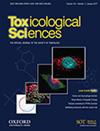Mechanisms underlying aryl hydrocarbon receptor-driven divergent macrophage function
IF 3.4
3区 医学
Q2 TOXICOLOGY
引用次数: 0
Abstract
Macrophages play an essential role in the innate immune system by differentiating into functionally diverse subsets in order to fight infection, repair damaged tissues, and regulate inappropriate immune responses. This functional diversity stems from their ability to adapt and respond to signals in the environment, which is in part mediated through aryl hydrocarbon receptor (AHR)-signaling. AHR, an environmental sensor, can be activated by various ligands, ranging from environmental contaminants to microbially derived tryptophan metabolites. This review discusses what is currently known about how AHR-signaling influences macrophage differentiation, polarization, and function. By discussing studies that are both consistent and divergent, our goal is to highlight the need for future research on the mechanisms by which AHR acts as an immunological switch in macrophages. Ultimately, understanding the contexts in which AHR-signaling promotes and/or inhibits differentiation, proinflammatory functions, and immunoregulatory functions, will help uncover functional predictions of immunotoxicity following exposure to environmental chemicals as well as better design AHR-targeted immunotherapies.芳基烃受体驱动巨噬细胞功能分化的机制
巨噬细胞在先天性免疫系统中发挥着重要作用,它们分化成功能多样的亚群,以抵抗感染、修复受损组织和调节不适当的免疫反应。这种功能多样性源于它们适应和响应环境信号的能力,这种能力部分是通过芳基烃受体(AHR)信号传导来实现的。AHR 是一种环境传感器,可被各种配体激活,包括环境污染物和微生物衍生的色氨酸代谢物。本综述将讨论目前已知的 AHR 信号如何影响巨噬细胞的分化、极化和功能。通过讨论既一致又有分歧的研究,我们的目标是强调未来研究 AHR 在巨噬细胞中充当免疫开关的机制的必要性。最终,了解 AHR 信号促进和/或抑制分化、促炎功能和免疫调节功能的背景,将有助于发现暴露于环境化学物质后免疫毒性的功能预测,以及更好地设计 AHR 靶向免疫疗法。
本文章由计算机程序翻译,如有差异,请以英文原文为准。
求助全文
约1分钟内获得全文
求助全文
来源期刊

Toxicological Sciences
医学-毒理学
CiteScore
7.70
自引率
7.90%
发文量
118
审稿时长
1.5 months
期刊介绍:
The mission of Toxicological Sciences, the official journal of the Society of Toxicology, is to publish a broad spectrum of impactful research in the field of toxicology.
The primary focus of Toxicological Sciences is on original research articles. The journal also provides expert insight via contemporary and systematic reviews, as well as forum articles and editorial content that addresses important topics in the field.
The scope of Toxicological Sciences is focused on a broad spectrum of impactful toxicological research that will advance the multidisciplinary field of toxicology ranging from basic research to model development and application, and decision making. Submissions will include diverse technologies and approaches including, but not limited to: bioinformatics and computational biology, biochemistry, exposure science, histopathology, mass spectrometry, molecular biology, population-based sciences, tissue and cell-based systems, and whole-animal studies. Integrative approaches that combine realistic exposure scenarios with impactful analyses that move the field forward are encouraged.
文献相关原料
| 公司名称 | 产品信息 | 采购帮参考价格 |
|---|
 求助内容:
求助内容: 应助结果提醒方式:
应助结果提醒方式:


